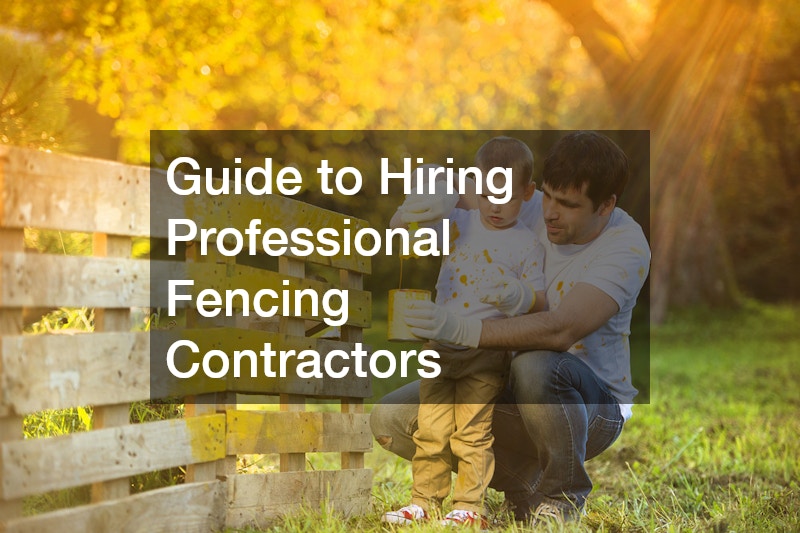Fencing plays a vital role in the functionality, security and aesthetic appeal of any property, whether residential, commercial or rural. From demarcating boundaries to keeping intruders out, a well-constructed fence delivers peace of mind and adds value. However, installing or repairing fencing is not just about choosing the right materials—it’s about having the right people for the job. Engaging professional fencing contractors can make all the difference in achieving a durable and compliant outcome that suits your specific needs. This guide walks you through what to consider when hiring fencing contractors and what to expect from the process.
Why Choose Professional Fencing Contractors?
Engaging experienced fencing contractors brings more than just skilled hands to your project—it introduces you to industry knowledge, legal compliance and quality assurance. Professional contractors understand local council regulations, including height limits, boundary lines and materials that are acceptable in your area. This is particularly important in Australia, where council guidelines vary between states and territories.
Additionally, professionals are equipped with the right tools, safety procedures and techniques to handle various terrains and property types. Whether you are securing a suburban backyard, enclosing farmland or installing a privacy fence for a commercial lot, the complexity can quickly increase. DIY efforts might seem cost-effective at first, but mistakes in measurements, alignment or installation can lead to costly rework or even disputes with neighbours. Professional fencing contractors mitigate such risks with precise workmanship and proper documentation.
What to Look for in a Fencing Contractor
The first step in hiring a contractor is research. Look for companies with established reputations, either through word of mouth, online reviews or verified industry accreditations. A reputable contractor should offer a portfolio of previous work, giving you insight into their expertise with various fencing styles—such as timber, steel, aluminium, glass or Colorbond. Understanding their strengths can help you assess whether they’re suitable for your project’s scale and aesthetic.
Licensing and insurance are non-negotiables. Confirm that the contractor holds relevant licences and carries both liability insurance and workers’ compensation cover. This protects you in the event of workplace accidents or property damage. A trustworthy contractor will not hesitate to provide documentation and will walk you through the agreement before commencing work.
Clarity in quotes and timelines is also crucial. A professional fencing contractor should offer a detailed written estimate that outlines the costs of materials, labour and any additional charges that may arise. Timelines should be realistic and include allowances for weather or material delivery delays. Clear communication at this stage builds trust and prevents disputes down the track.
Understanding the Scope of Work
A solid contract should define the scope of work in detail. This includes the type and height of fencing, gate placements, soil preparations, post installations and any removal of existing fencing. It’s also wise to clarify who is responsible for securing council approvals or permits if they’re required. While some fencing contractors will manage this on your behalf, others may require the property owner to handle council applications independently.
Site inspection is a fundamental step that precedes the quote. A contractor who skips this may not fully understand the complexities of your land. Sloped terrain, underground utilities, tree roots and accessibility issues can affect both cost and construction methods. Insist on a site visit before committing, as it enables a more accurate quote and helps identify potential challenges early.
Working with Your Contractor During the Project
Once the work begins, communication is key. A professional contractor will keep you informed throughout each stage, from preparation and digging to post-setting and final adjustments. Be available for any questions they may have, particularly regarding property lines or access points.
It’s also worth respecting the worksite. Keeping pets or children away from the area ensures their safety and allows the crew to work efficiently. If issues arise—such as material shortages or unexpected obstructions—a good contractor will communicate promptly and suggest practical solutions rather than proceeding without your input.
Post-Installation Considerations
After installation, a walk-through with your contractor can confirm the project meets your expectations. Examine the alignment, sturdiness and finishes, ensuring all specifications have been met. This is also the time to review maintenance instructions. Different materials have varying requirements—timber may need sealing, while metal fencing might require rust-resistant treatments or coatings.
Request warranties or guarantees in writing. Most professional fencing contractors offer a workmanship warranty, along with manufacturer warranties on materials. Keep all receipts and documents filed safely for future reference.
Routine maintenance, although minimal with many modern materials, should not be overlooked. Fences endure exposure to the elements and can shift or degrade over time if neglected. Establishing a basic maintenance routine will prolong the life of your investment and uphold your property’s curb appeal.
Investing in Experience Pays Off
Hiring professional fencing contractors is a decision that affects not only the appearance of your property but also its safety, compliance and long-term value. From selecting materials and understanding regulations to executing precise installations, professionals bring a level of reliability that DIY methods simply cannot match. When chosen carefully, fencing contractors become partners in enhancing your property and ensuring that your fence stands strong for years to come.
.

